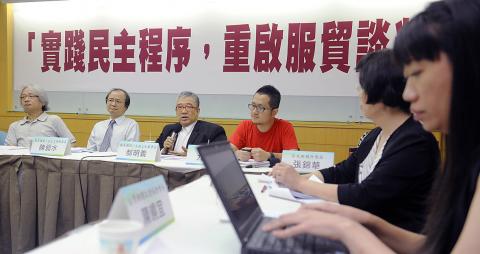Taiwanese artists, academics and representatives from the publishing and media sectors issued a joint statement yesterday calling on the government to reopen negotiations on the service trade pact that Taiwan and China signed last month.
The statement demanded that the Legislative Yuan hold individual public hearings on every industry affected by the pact and postpone a review of, or voting on, the pact until the government has released reports evaluating the impact of the agreement on Taiwan’s industries, society and national security.
The government should also recommence negotiations with China on the basis of the results of the legislature’s item-by-item review of the pact, according to the statement, which was issued by 18 academics, artists and representatives of the publishing and media industries.

Photo: George Tsorng, Taipei Times
Rex How (郝明義), a presidential adviser and chairman of Locus Publishing Co (大塊文化), questioned the negotiation process and criticized the government for not fully communicating with local businesses before signing the agreement.
Jang Show-ling (鄭秀玲), professor and chair of National Taiwan University’s Department of Economics, said the service pact would affect more than 1,000 industries and millions of workers in Taiwan, but the government has not been honest with the public about the impact of the agreement.
China has not committed in many areas to allowing Taiwanese companies to provide cross-border services, Jang said, adding that this could trigger an exodus of many Taiwanese professionals as well as small and medium-sized enterprises to China.
Under the agreement, China will open 80 service categories to Taiwanese investors, while Taiwan will open 64 categories to Chinese investment, including e-commerce, transportation, finance and medical care.
Although the sensitive publishing sector was not included in the pact, Jang questioned whether the opening of wholesale and retail services would allow Chinese publishers to sell their books in Taiwan.
“The doors are wide open,” she said.
Popular novelist and filmmaker Giddens Ko (柯景騰) called for a serious public debate on the issue, saying that the signing of the agreement should have followed a more democratic process.
“I hoped that the negotiation process could be more transparent, so that we could have a basic trust in the government,” Ko said.
Ruling and opposition legislators have reached a consensus that the agreement should be reviewed by all legislative committees during a Legislative Yuan extraordinary session, scheduled to be held from yesterday through Friday next week.

DAREDEVIL: Honnold said it had always been a dream of his to climb Taipei 101, while a Netflix producer said the skyscraper was ‘a real icon of this country’ US climber Alex Honnold yesterday took on Taiwan’s tallest building, becoming the first person to scale Taipei 101 without a rope, harness or safety net. Hundreds of spectators gathered at the base of the 101-story skyscraper to watch Honnold, 40, embark on his daredevil feat, which was also broadcast live on Netflix. Dressed in a red T-shirt and yellow custom-made climbing shoes, Honnold swiftly moved up the southeast face of the glass and steel building. At one point, he stepped onto a platform midway up to wave down at fans and onlookers who were taking photos. People watching from inside

A Vietnamese migrant worker yesterday won NT$12 million (US$379,627) on a Lunar New Year scratch card in Kaohsiung as part of Taiwan Lottery Co’s (台灣彩券) “NT$12 Million Grand Fortune” (1200萬大吉利) game. The man was the first top-prize winner of the new game launched on Jan. 6 to mark the Lunar New Year. Three Vietnamese migrant workers visited a Taiwan Lottery shop on Xinyue Street in Kaohsiung’s Gangshan District (崗山), a store representative said. The player bought multiple tickets and, after winning nothing, held the final lottery ticket in one hand and rubbed the store’s statue of the Maitreya Buddha’s belly with the other,

‘NATO-PLUS’: ‘Our strategic partners in the Indo-Pacific are facing increasing aggression by the Chinese Communist Party,’ US Representative Rob Wittman said The US House of Representatives on Monday released its version of the Consolidated Appropriations Act, which includes US$1.15 billion to support security cooperation with Taiwan. The omnibus act, covering US$1.2 trillion of spending, allocates US$1 billion for the Taiwan Security Cooperation Initiative, as well as US$150 million for the replacement of defense articles and reimbursement of defense services provided to Taiwan. The fund allocations were based on the US National Defense Authorization Act for fiscal 2026 that was passed by the US Congress last month and authorized up to US$1 billion to the US Defense Security Cooperation Agency in support of the

‘COMMITTED TO DETERRENCE’: Washington would stand by its allies, but it can only help as much as countries help themselves, Raymond Greene said The US is committed to deterrence in the first island chain, but it should not bear the burden alone, as “freedom is not free,” American Institute in Taiwan Director Raymond Greene said in a speech at the Institute for National Defense and Security Research’s “Strengthening Resilience: Defense as the Engine of Development” seminar in Taipei yesterday. In the speech, titled “Investing Together and a Secure and Prosperous Future,” Greene highlighted the contributions of US President Donald Trump’s administration to Taiwan’s defense efforts, including the establishment of supply chains for drones and autonomous systems, offers of security assistance and the expansion of